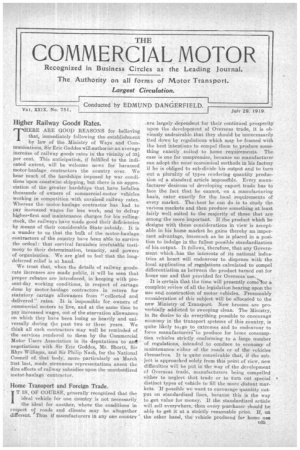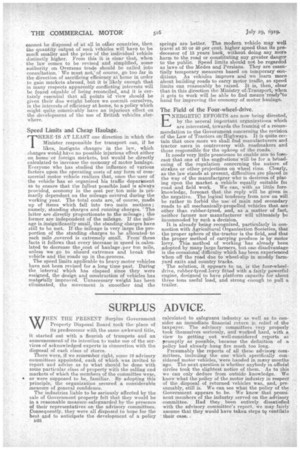Higher Railway Goode Rates.
Page 1

Page 2

If you've noticed an error in this article please click here to report it so we can fix it.
THERE ARE Goop REASONS for believing that, immediately following the establishment by law of the _Ministry of Ways and Com, munications, Sir Eric Geddes will authorize an average increase of railway goods rates in the vicinity of 33i per cent. This anticipation, if fulfilled to the indicated extent, will be welcome news for harassed motor-haulage, contractors the country over. We hear much of the hardships imposed by war conditions upon coastwise shipping, but there is no appreciation of the greater hardships that have befallen thousands of owners of commercial-motor vehicles working in competition with unraised railway rates. Whereas the motor-haulage contractor has had to pay increased wages for less work, and to defray higher-first and maintenance charges for his rollingstock, the railways have made good their deficiencies by means of their considerable State subsidy. It is a wonder to us that the bulk of the motor-haulage contractors of the country have been able to survive the ordeal: that survival furnishes irrefutable testimony to their determination, tenacity, and powers of organization. We are glad to feel that the longdeferred relief is at hand.
We trust that, when the details of railway goodsrate increases are made public, it will be seen that proper rebates are introduced, in keeping with present-day working conditions, in respect of cartage done by motor-haulage contractors in return for statutory cartage allowances from " collected and delivered" rates. It is impossible for owners of commercial motors to live, and at the same time to pay increased wages, out of the starvation allowances on which they have been losing so heavily and universally during the past two or three years. We think all such -contractors may well be reminded of the services rendered to them by the Commercial Motor Users Association in its deputations to an* negotiations with Sir Eric Geddes, Mr. Shortt, Sir Rhys Williams, and Sir Philip Nash, for the National Council of. that .body, more -particularly on March :list last, made strenuous representations anent the dire effects of railway subsidies upon the unsubsidized motor-haulage contractor.
Horne Transport and Foreign Trade.
IT IS, OF COUII,SE, generally recognized that the ideal vehicle for one country is not necessarily, the ideal for another, where the conditions in respect of j roads and climate may be altogether different. Thus if manufacturers in any one country' -are largely dependent for their continued prosperity upon the development of Overseas trade, it is obviously undesirable that they should be unnecessarily tied down by regulations which may be. framed with the best intentions to compel them to produce something exactly suited to home requirements. The case is one for compromise, because no manufacturer can adopt the most/ economical methods in his factory if he is obliged to sub-divide his output and to turn out a plurality of types rendering quantity production of a standard article imposstble. Every manufacturer-desirous of developing export trade has to face the fact that he cannot, on a manufacturing basis, cater exactly for the local requirements of every market. The .best he can do is to study the various markets and then produce something at least fairly well suited to the majority of those that are among the more important. If the product which he designs with these considerations in view is acceptable in his home market he gains thereby an important advantage, inasmuch as he is placed in a position to indulge in the fullest possible standardization of his output. It follows, therefore, that any Government which ,has the interests of its national industries at heart will endeavour to dispense with the local application of regulations calculated to compel differentiation as between the product turned out for home use and that provided for Overseas use. It is certain that the time will presently comNor complete re-view of all the legislation bearing upon the use and construction of motor vehicles. Presumably consideration of this subject will be allocated to the new Ministry of Transport. New brooms are proverbially addicted to sweeping clean. The Ministry, in its desire to do everything possible to encourage economy in'the transport systems of this country, is quite likely tolgo to extremes and to endeavour to force manufacturersno produce for home consumption vehicles strictly conforming to a. large number• of regulations, intended .to conduce to economy of maintenance either of the roads or of the vehicles themselves. It is quite conceivable that, if the subject is approached solely from this point of view, new difficulties will be put in the way of the development cf Overseas trade, manufacturers being compelled either to neglect that trade or to turn out special distinct types of vehicle to fill the more distant markets. _If possible we want to encourage quantity output on standardized lines, because this is the way to get value for money. If the standardized article will sell everywhere, then every purchaser should be able to get it at a strictly reasonable price. If, on the other hand, the vehicle produced for home use n25 cannot be disposed of at all in other countries, then the quantity output of such vehicles will have to be much smaller and the price 'of the individualvehicle distinctly higher. From this it is clear that, when the law comes to be revised and simplified, some authority on Overseas trade should be called into consultation. We must not,' of course, go too far in the direction of sacrificing efficiency at home in order to gain markets abroad, but it is likely enough that in many respects apparently conflicting interests will be forind eqmble of being reconciled, and it is certainly essential that all points of view should be given their due weight before we commit ourselves, in the interests of efficiency at home, to a policy which might quite conceivably have an injurious effect on the development of the use of British vehicles elsewhere.
Speed •Limits and Cheap Haulage.
THERE -IS AT LEAST one direction in which the Minister responsible for transport can, if he likes, instigate changes in the law, which changes would have no possible injurious effect either on home .or foreign markets, but would be directly calculated to increase the economy of motor haulage. Everyone who has studied the influence of various factors upon the operating costs of any form of cornreeecial motor vehicle realizes that, once the user of the vehicle has so organized his traffic departimerit as to ensure that the fullest possible load is always provided, economy in the cost per ton mile is primarily dependent on the mileage coVered during the working year. The total costs are, of course, made up of items which fall into two main sections; namely, standing charges and running charges. ' The latter are directly proportionate to the mileage; the former are independent of the mileage. If the mileage is insignificantly small, the standing charges have still to be met. If the Mileage is very large the proportion of the standing charges to be allocatedto each mile .covered is extremely small. From these . facts it follows that every increase in speed is.ealeulated. -to decrease the.cost of haulage perton mile, unless we go to absurd extremes and break the vehicle and the roads up in the,process.
The speed limits applicable to heavy motor vehicles have not been revised for a long time past. During the interval which has elapsed since they were assigned, the design and construction of vehicles has materially improved. Unnecessary weight has been eliminated, the movement is smoother and the springs are better. The modern vehicle may well travel at 30 or 40 per cent. higher speed than its predecessor of 15 years back, without. doing any more harm to the road or constituting any greater danger to the public. Speed limits shouldnot be regarded as laws-of the Medes and Persians. They are e,sserie tially temporary measures based on temporary conditions. As vehicles improve and we learn more about building roads to carry motor traffic, so speed limits can reasonably be raised. It is, then, clear that in this direction the Ministry, of Transport, when it gets to work will be able to find means'readfto hand for improving the economy of motor haulage.
The Field of the Four-wheel-drive.
ENERGETIC EFFORTS are now being directed, . by the several important organizations which are interested, towards the framing of a reeommenclation to the Government concerning the revision Of the Law of Tractors on4lighways. It is quite certain that once more we shall find manufacturers and tractor users in controversy with roadina,kers and those responsible-for.the upkeep of the roads. It needs very little prescience to enable one to forecast that one of the suggestions' will be for a broadening of the regulation concerning the nature of strakes or other projections on wheel rims. CIearlb as the law stands at present, difficulties ace placed in the way of the manufactnrer who is desirous of plan ing upon the market a vehicle equally suitable for road and field work. We -can, with as little foreknowledge, forecast that the reply will he given in the negative. The logical tendency from now on will be rather to forbid the use Of main and secondary roads to all mechanically-propelled vehicles that are other than rubber-tyred, and, as a matter of fact, neither farmer nor manufacturer will ultimately be ineommoded by Such a decision. It is already being recognized, particularly in connection with Agricultural Organization Societies, that the proper sphere of the tractor is the field, and that the proper method of carrying produce is by motor lorry. 'This, method of working has already been adopted by many large farmers, but one disadvantage is the occasional difficulty which has been experienced when off the road due to wheel-slip in muddy farmyard exits and country tracks.
The solution, it appears to us, is the four-wheeldrive, rubber-tyred:lorry fitted with a fairly powerful engine, designed to have platform capacity for about three tons useful Lead, and strong enough to pull a trailer.






















